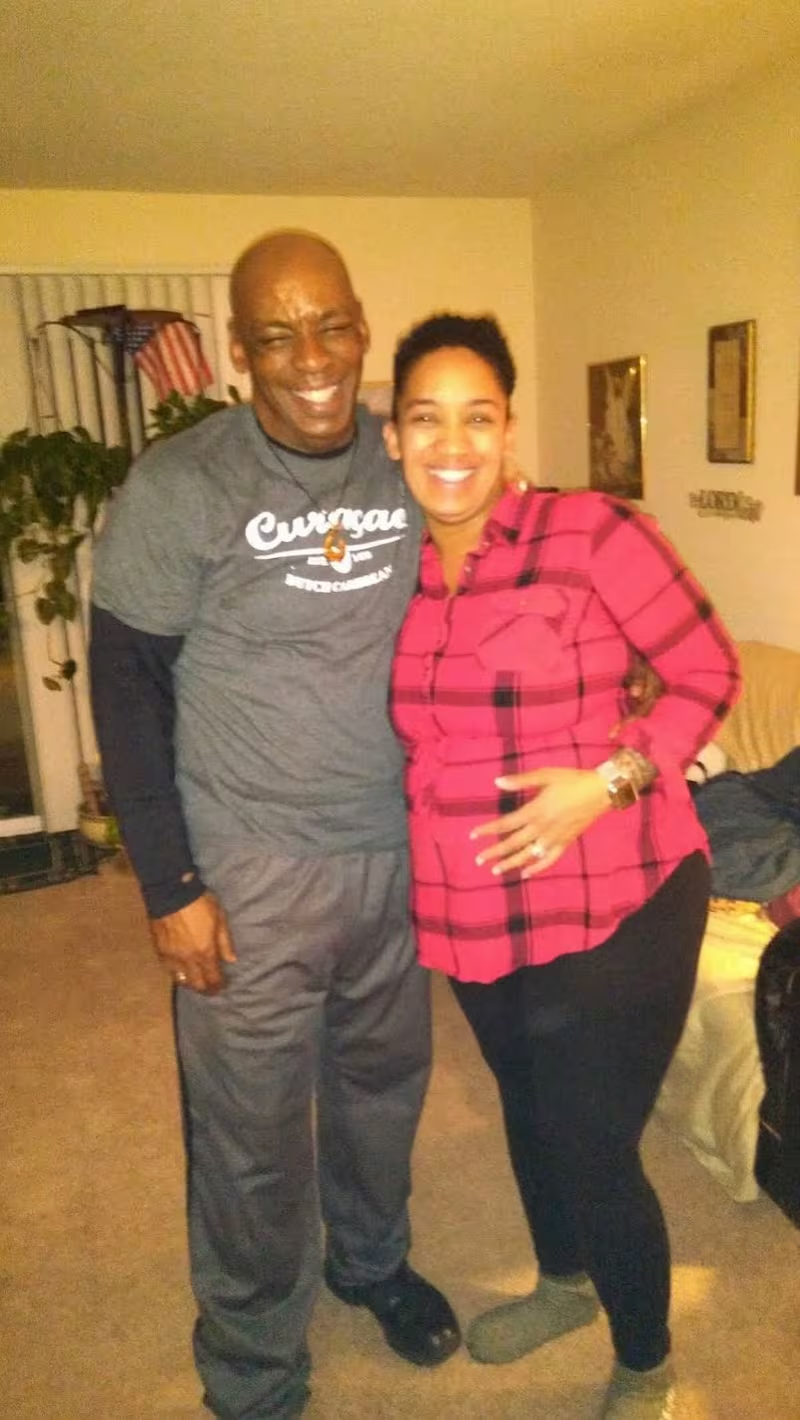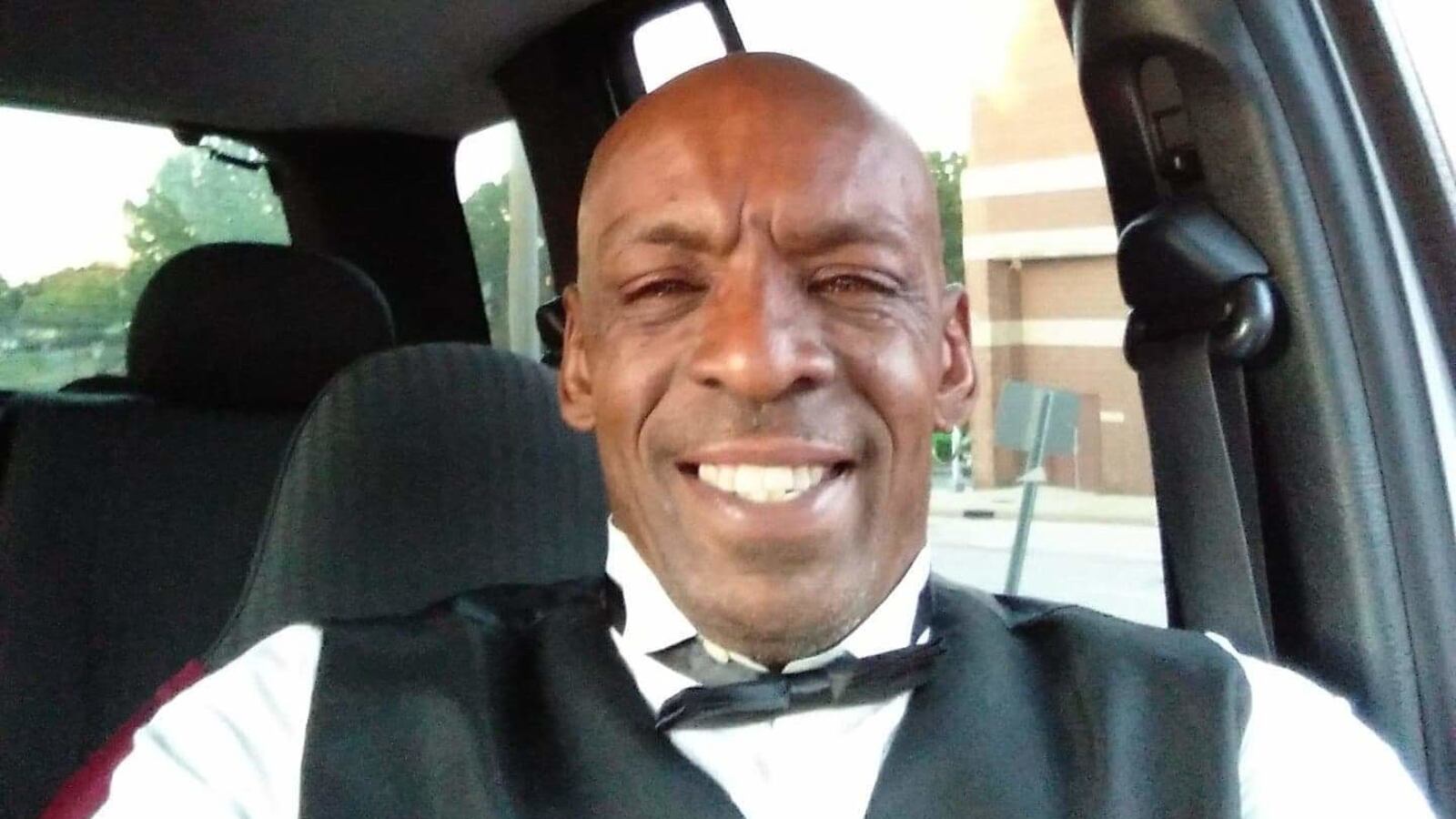A North Carolina judge has ordered the release of video showing a man’s final moments in a Winston-Salem lockup, where he cried out, “I can’t breathe,” while detention officers placed him face-down and struggled to remove his handcuffs.
John Elliott Neville, a 56-year-old father of five children, died at a hospital three days after his December 2019 arrest. He was cuffed on a warrant for allegedly assaulting a woman and booked into the Forsyth County jail, where officers restrained him in what's been described as a hog-tie position. Neville was asphyxiated, according to an autopsy report. He died of a brain injury due to cardiac arrest, the report stated.
On Friday, Superior Court Judge R. Gregory Horne ruled the Forsyth County Sheriff’s Office must release two video files by 12 p.m. on Aug. 5.
One is body-cam footage from a guard who’s facing criminal charges over Neville’s death. A collection of other videos “shall remain under seal pending further order by a Superior Court Judge or the North Carolina Appellate Courts,” Horne said in his order.
Horne added, “These alleged actions, occurring while Mr. Neville was in custody, relate to a matter of significant local, state and national public interest and the release of the recording is necessary to advance a compelling public interest.”
Earlier this week, Neville's children broke their silence and demanded the footage be released in order to push for reforms within the county jail.
“The biggest takeaway for me, that I’m trying to get people to understand about all this, is that we’re not seeking revenge,” Tasha Martin, one of Neville’s children, told The Daily Beast. “We want to make sure that this doesn’t happen to another family.”
Sean Neville, one of his sons, described Friday’s ruling as “bittersweet.”
“It wasn’t our initial plan,” said Sean, 33, of Winston-Salem. “We really wished we could keep it private because it’s hard to watch. It’s hard to watch for people who never met him, so it’s especially hard for us.”
“If it helps other people, we can set aside our grief, we can set aside our pain,” he added. “It might mean another family never has to go through what we did. If we help one person, then all of this is worth it.”
Five former detention officers and one nurse, who is employed by a private contractor, have been charged with involuntary manslaughter in connection with Neville’s death.
The officers include Antonio Maurice Woodley Jr., 26; Sarah Elizabeth Poole, 36; and Christopher Bryan Stamper, 42; as well as Lt. Lavette Maria Williams, 47, and Cpl. Edward Joseph Roussel, 50. The nurse is 44-year-old Michelle Heughins. (Williams and Woodley are Black, while the other officers are white, the sheriff’s office said.)
All defendants but Heughins will return to court Nov. 6, according to the Forsyth County clerk of court. Heughins’ last court appearance was Thursday.
As demonstrations ramped up over the death of George Floyd, an unarmed Black man killed by Minneapolis police, Neville’s case began to attract more attention. Some of Neville’s last words—specifically “I can’t breathe”—were not only uttered by Floyd, but also by Eric Garner, who died in 2014, after an NYPD officer placed him in a chokehold.
Martin, 35, said her father begged and pleaded for the detention officers to turn him over and said he couldn’t breathe 23 times.
“This was someone’s loved one. This was a human being,” Martin told FOX8 in Greensboro, adding, “That position they put him in contributed to his death. It’s very evident that the damage was done within the jail cell.”

John Neville with his daughter, Tasha Martin.
Courtesy Tasha MartinMartin questioned why the officers and nurse didn’t take Neville to the infirmary when, as the video shows, they said at the time that he was having a medical emergency.
In an interview with The Daily Beast, Martin said, “These officers were making jokes. They checked on each other constantly. ‘Are you good? Are you good?’ They look down on him and say, ‘He’s not good,’ and they start to laugh.”
Martin, who saw the video for the first time Wednesday, said that in the footage, fellow inmates can be heard singing “Amazing Grace” when EMTs arrived to transport her father to the hospital. She said she heard one detainee declare, “Rest in Peace, John,” and another remark, “They killed that man.”
As a sergeant in the Army Reserve, Martin said she was deployed to Guantanamo Bay and served as a military police officer. “I have the experience that these people on the video have,” Martin told The Daily Beast. “I’m a victim but I’m also law enforcement, so I’m able to see both sides. When I watched the video, I was able to see what they did right and what they did wrong.”
“You had three seasoned officers there and you still had a man die,’ Martin said. “That’s crazy.”
Neville was booked into the jail Dec. 1 on a $2,000 bond. Around 3:30 a.m. the following morning, he tumbled from his top bunk bed, and jailers brought him to an observation room to see a nurse. Neville’s cellmate had pressed an emergency button after waking to a loud bang and observing Neville shaking on the floor, with vomit on his clothing and blood on his mouth. The cellmate said it appeared that Neville was having a seizure. Indeed, the autopsy report indicated guards found Neville on the floor in a “seizure-like” episode.
Sometime in the next hour, Neville would suffer the injuries that led to his death as officers tried to remove his handcuffs. The autopsy report says the key to the cuffs broke inside the lock about 2 minutes after officers placed Neville in a prone position. The officers tried to use another key, then tried two different bolt cutters to unfasten the restraints. The cuffs were moved after a total of 12 minutes, the autopsy stated.
“They were making jokes and laughing over our dad while he’s in duress, making jokes about the handcuffs, because one of the keys broke inside the handcuffs,” Martin told FOX8. “One of them was like, ‘Oh, that’s coming out of your paycheck,’ and they started laughing.”
Neville warned the officers, “I can’t breathe,” at least 10 times. He also begged for help by telling them, “Please,” “Help me,” and “Let me go.” At one point, Neville asked for his mother.
“Come on, buddy, if you can talk, you can breathe,” one officer allegedly replied, according to a Winston-Salem Journal report citing three independent sources.
It was during this struggle that Neville stopped moving. “The last intelligible phrase he made was around 3½ minutes after [he was] placed prone on the mattress,” the autopsy report noted.
The jailers removed Neville’s jail jumpsuit and left him in the cell, where he was in a prone position. Officers returned when the nurse saw Neville wasn’t breathing.
Jail staff revived Neville, but he went into a coma and died at the hospital.

John Neville’s family says the public should see what led to his death.
Courtesy Tasha MartinAccording to the Journal, Neville's death was not made public by the Forsyth County Sheriff’s Office until June 26, when the newspaper began asking questions.
Until Friday, video of the deadly encounter was not released, as law enforcement and body-cam footage are not public record under North Carolina law. Any person seeking such video is required to petition a judge to release it.
News outlets including The News & Observer, a daily newspaper in Raleigh, the Associated Press, and The New York Times filed a petition to release the footage.
Neville’s children attended a hearing on Wednesday in support of making the video public. One daughter, Brienne Neville, released a statement afterward.
“We are expected to have pity for those charged and make no mistake, we do,” Brienne told the Journal. “We are told they have received threats or have had to move for fear of their lives. At least they have a life to fear for, our father does not.”
Brienne added that she supports protests demanding reforms. “Our efforts are not just for justice for our father but for your fathers, your children, your families who daily feel the pain and pressure of racism and police brutality,” she added. “So fight with us, not against us.”
Still, Forsyth County District Attorney Jim O'Neill opposed the release of any video clips, saying he had to make sure the jailers and the nurse received a fair trial.
Sheriff Bobby Kimbrough said the detention officers didn’t mean to harm Neville and that it was a “tragic situation.” He said he apologized to the Neville family.
“I want to say that good men and women made a bad decision that day and as a result a good man died. And for that, that’s a tragic day and a tragic situation—good people trying to do the right thing,” Kimbrough said at a news conference, adding that he spoke with his former officers as they made their way to the magistrate’s office.
According to Kimbrough, those ex-officers said, “Sheriff, tell them we meant their father no harm. We were trying to assist and help.” He also claimed that Neville’s family had asked his office to keep the incident private.
For Martin, her father’s death cut short a relationship they were just beginning to nurture.
“He wasn’t in my life growing up,” Martin told The Daily Beast. “I only met him two years ago. We were building a relationship. I was just getting to know my dad, and I was robbed of that.”
Martin said her mother and Neville broke up, and that she never got to meet her dad. She was raised by another man who died in 2013. Three years later, Martin tracked down Neville on Facebook during one of her deployments to Guantanamo. “John Neville is a very common name,” she said. “Trust me. I tried Googling it years ago.”
“When we first connected, his big thing was he wanted to be a part of my life. He wanted to make up for all the time we had lost,” said Martin, who lives in Baltimore and was unable to see Neville often. Instead, they kept in touch over calls and texts.
“This is one of those times where it makes you realize not to take people for granted because you don’t know when it’s going to be the last time you talk to them,” Martin said. “I was looking forward to him meeting my family. He hasn’t met my boys or my husband.”
“I’m grateful for the fact that he was receptive to me. It could have been all too easy for him to turn me away. He was excited for me, for my accomplishments, family, career, all of that. He told me one time he was proud of me. That he loved me.
“That meant a lot. I feel so robbed in all of this.”
According to Martin, Neville was a die-hard fan of the University of North Carolina Tar Heels basketball team. He played basketball and stayed in shape; he was a happy person.
Brienne told the Journal that Neville loved Jamaican food and dancing and worked in construction. After Hurricane Katrina, he volunteered in Louisiana. “He wasn't perfect. He was human. He enjoyed life,” Brienne told the newspaper.
Neville’s mother died when he was a teenager, and he was physically abused by a relative when he was young, Brienne and one of his sons, Kristopher Brown-Neville, said.
“I think our dad was a prime case of somebody who needed help because of trauma as a child but [never got it],” Brienne told the Journal. “His struggle was that he wanted those things but didn’t know how to get those things.”
Michael A. Grace, a lawyer for Neville’s family and estate, told The Daily Beast there was no coverup by the sheriff's department; the family requested the sheriff not go public until the medical examiner’s report was complete and the district attorney made a decision on filing charges.
Grace said Neville’s family did not see a video compilation until recently because state law required them to be administrators of his estate to have standing. COVID-19 slowed down the estate’s legal filings in the courts, Grace added.
According to Grace, the video includes multiple body cameras, along with footage from a jail videographer. “I wept and my partner wept when we saw it,” he said.
“I think the conversation starts with the video,” Grace said, adding that it’s impossible to have conversations about institutional change and recompense for the family without the release of the footage. “Now it’s time for the public to see it.”
“The bigger picture is how he died and whether his death could have been avoided. It starts with the video,” Grace told The Daily Beast.






